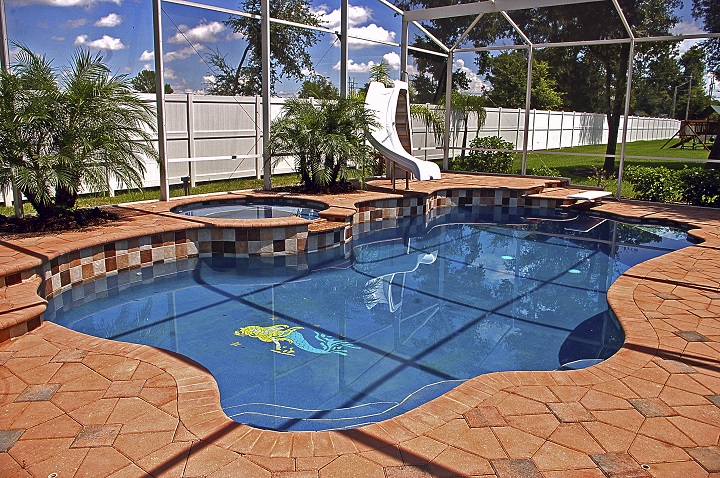Concrete vs. Pavers for Your Pool Deck
Having a pool is amazing, but when you think about backyards and beautiful homes, the pool deck can often be as important or even more important than the body of water it surrounds. The deck is what provides access to the pool. It controls the aesthetic of the whole yard, and it’s a surface you’ll utilize throughout the year. You might soak up some sun on your deck in the summer, or you might use it to grill or enjoy a fire in the winter. When choosing the materials to use for your deck, you’ll want to know your options. Do you want a concrete deck, or do you prefer pavers? A close look at both can help you answer that question.

Concrete
Concrete is far and away the most common material used to make pool decks. Concrete is strong, accessible, and reliable. It can be formed to any shape you want, and it can be reinforced for ultimate strength if you really need it. Despite concrete’s popularity, it isn’t a perfect substance. Concrete comes with its strengths and weaknesses, and understanding them can help you make an informed decision about your deck.
Pros
Concrete is great for a number of reasons. First is the cost. The most expensive concrete will be close in price to the cheapest pavers. Also, installation for concrete is easier than for pavers, so your install costs are lower too. If budget is your top concern, it will be hard to pass on concrete.
Concrete offers a ton of colors. Simple dyes can be added to the wet concrete to get almost any color you could want. On top of that, concrete can be stamped to use textures to enhance the overall aesthetic.
Cons
The downside, however, is that concrete cracks. And due to the red clay soil that’s found in the region, concrete pool decks in North Texas tend to crack after a very short period of time.
Concrete can also get very hot in the summer, which means it’s not the top choice for a cool deck. There are finishes and additives that can help with this, but they raise the cost.
Perhaps the most important con is that concrete is slippery. A stamped texture can help a little, but really the concrete needs an anti-skid agent to make it safe. While you’re at it, regular treatments are necessary to keep the concrete from degrading over the years, so there’s a maintenance issue to remember.
Pavers
Concrete might be the most popular, but paver decks are chosen often as well. There are good reasons for this. In most cases, paver decks look better than their concrete counterparts. In addition to beauty, pavers offer a number of advantages that make them quite appealing. Of course, those advantages come with trade-offs, and it’s important to understand what you’re sacrificing when you pursue the benefits of pavers.
Pros
It’s surprising, but when they are installed properly, pavers are actually more durable than concrete. Because they’re made of small pieces, they aren’t prone to cracking. Even assuming a paver gets damaged, it can be replaced independently, which is a nice advantage.
Pavers typically are not very slippery because they have texture and joints everywhere. You can choose pavers that are right for a cool deck (but there are plenty of pavers that do get hot, so pay attention). Also, pavers offer aesthetic options that you won’t get with concrete. You can mix and match different pavers to create accents and all kinds of cool designs in your deck.
Cons
We’ve already covered that the pavers cost more, both for raw materials and in installation costs. Pavers are also more likely to allow weeds to grow. You can prevent this with treated sand, but that raises the price tag again.
Ultimately, the choice between concrete and pavers for your pool deck comes down to whether you want a lower cost now or less hassle in the long run. Whatever you choose, Select Pool Services will handle installing your deck to make sure it is up to code and a great addition to your pool. Contact us online or by phone at 214.755.7665.
